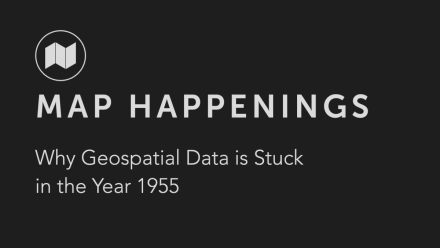Some more interesting paragraphs and compliments from the transcript to the slide deck
Sounds like they’re impressed with the “visual” features that also enable them to enter Japan. But lack of standardization is a sticking point, e.g,. no date convention in tags?
And also the open source community has gone from strength to strength. The OpenStreetMap community is producing and maintaining a visually extremely attractive map, with a wealth of detail.
Now, our new Maps Platform is designed to bring all those sources together in a consistent way to power the most demanding applications.
But also until now, Japan was out of reach. It was simply a too expensive and too difficult market to enter. But here we are starting with a new map, with a very impressive base map already, from where we can improve using our other sources, such as trace data, sensors-derived observations, and more.
And it also lacks standardization, which is challenging. Each country runs its own community and there’s a bunch of differences, even for simple things like month-day. It can be flipped depending on the country, making it really difficult to work with on a global map. And of course, big companies trying to do a lot of work can’t do automation, which is problematic when you’re trying to leverage all the sensor data you’re getting
Automotive has been evaluating OSM but they’ve haven’t been able to really leverage it, again due to the challenges, but also because they’re more cautious with the quality, particularly in coverage and routing. Some have looked at it, but they haven’t gone very far with it. This is where TomTom’s Maps Platform comes in.
And this is where the disruption is happening. This is big. Now, those using OpenStreetMap can get the full coverage of TomTom’s road network. And that provides a significant opportunity for everyone to co-collaborate. It’s everything great about TomTom with the added richness of OSM. The TomTom Maps Platform makes OpenStreeMap enterprise-ready, commercial-grade. What I mean by this is that we’re going to add in all the extra features and capabilities that have blocked people from using OSM, like standardization of the content. TomTom’s Map Platform will read in OSM data and normalize it to a single standard globally. We’re working with a few of the top tech companies in the world on this standardization.
Now, we’ve talked about OpenStreetMap as a very important source. This is a human-curated source that is good at certain types of features. For instance, visual features. Their roadmap and the community is worldwide, meaning that this quality, they’re able to provide on a worldwide basis. Now, we as TomTom intend to be a very good corporate member of this community, also giving back
 button above the comment box, to the left of the topic subject line, to reveal options for splitting out a new topic or moving to direct messages. This keeps the rest of the topic’s participants from getting dragged into tangents they’re less interested in. Thanks for understanding.
button above the comment box, to the left of the topic subject line, to reveal options for splitting out a new topic or moving to direct messages. This keeps the rest of the topic’s participants from getting dragged into tangents they’re less interested in. Thanks for understanding.